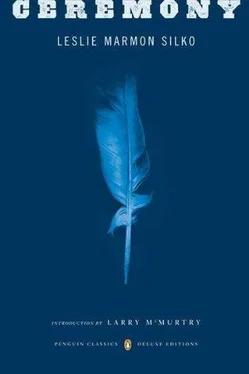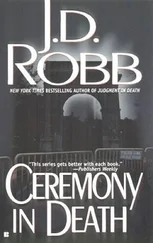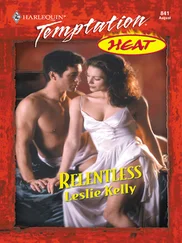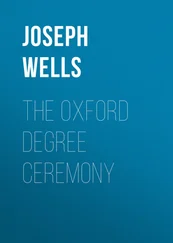Leslie Silko - Ceremony
Здесь есть возможность читать онлайн «Leslie Silko - Ceremony» весь текст электронной книги совершенно бесплатно (целиком полную версию без сокращений). В некоторых случаях можно слушать аудио, скачать через торрент в формате fb2 и присутствует краткое содержание. Год выпуска: 2006, Издательство: Penguin Classics, Жанр: Современная проза, на английском языке. Описание произведения, (предисловие) а так же отзывы посетителей доступны на портале библиотеки ЛибКат.
- Название:Ceremony
- Автор:
- Издательство:Penguin Classics
- Жанр:
- Год:2006
- ISBN:нет данных
- Рейтинг книги:5 / 5. Голосов: 1
-
Избранное:Добавить в избранное
- Отзывы:
-
Ваша оценка:
- 100
- 1
- 2
- 3
- 4
- 5
Ceremony: краткое содержание, описание и аннотация
Предлагаем к чтению аннотацию, описание, краткое содержание или предисловие (зависит от того, что написал сам автор книги «Ceremony»). Если вы не нашли необходимую информацию о книге — напишите в комментариях, мы постараемся отыскать её.
Tayo's quest leads him back to the Indian past and its traditions, to beliefs about witchcraft and evil, and to the ancient stories of his people. The search itself becomes a ritual, a curative ceremony that defeats the most virulent of afflictions — despair.
Ceremony — читать онлайн бесплатно полную книгу (весь текст) целиком
Ниже представлен текст книги, разбитый по страницам. Система сохранения места последней прочитанной страницы, позволяет с удобством читать онлайн бесплатно книгу «Ceremony», без необходимости каждый раз заново искать на чём Вы остановились. Поставьте закладку, и сможете в любой момент перейти на страницу, на которой закончили чтение.
Интервал:
Закладка:
He became aware of the place then, of where he was. He had never seen her again after that day. The summer kept them busy, and by early September he and Rocky had enlisted and were gone. They said that she left after Josiah’s funeral, and nobody knew where she went, only that she walked to the highway with a suitcase.
The screen door was propped open against the side of the building with a large round sandrock. He expected the door to be locked when he turned the cut-glass knob, but it swung open. The room was empty. His steps inside sounded hollow, like a sandstone cave in the cliffs. The floor was covered with a layer of fine brown dust that had pushed under the door, and between the walls and the window sash; the dust drifted up in little clouds around his feet.
The white curtains were gone, and he could see through the doorway to a small back room. Whatever had been there, the music, the currents of air that had moved so restlessly that day, was gone. He looked for some signs of what had been there, but all that was left was a hole in the ceiling where the stove pipe had been.
He stood in the dim gray light, watching the darkness push between him and the bare room. He breathed deeply, trying to find a trace of the locust-blossom perfume, but all he smelled was the white clay plaster, as timeless as the cliffs where it came from.
He walked all the way to Casa Blanca, listening to the crickets scattered around him like the stars. He climbed the old ladder into the loft of the barn behind Harley’s grandpa’s house. It was a warm night; he lay down in the old hay and he slept all night without dreams.
Fly started sucking on
sweet things so
Hummingbird had to tell him
to wait:
“Wait until we see our mother.”
They found her.
They gave her blue pollen and yellow pollen
they gave her turquoise beads
they gave her prayer sticks.
“I suppose you want something,” she said.
“Yes, we want food and storm clouds.”
“You get old Buzzard to purify
your town first
and then, maybe, I will send you people
food and rain again.”
Fly and Hummingbird
flew back up.
They told the town people
that old Buzzard had to purify
the town.
“I’m feeling better,” Tayo said, “I’ve been doing okay. I can start helping you now.” He poured Robert a cup of coffee and carried it over to the table; his hands were shaking when he set the cup down. Robert didn’t say anything. He stirred the sugar into the coffee slowly, silently, as if getting ready to say something. Maybe there would always be those shadows over his shoulder and out of the corner of each eye; and in the nights the dreams and the voices. Maybe there was nothing anyone could do for him. Robert looked up at him. “The other day old man Ku’oosh came to the house. He told your grandma what some of the old men are thinking. They think you better get help pretty soon.”
“But I haven’t been in trouble for a long time, not since that time with Emo.”
“I know, but there are other things too.”
“Oh.” Tayo knew. There were other things. “It isn’t just me, Robert. The other guys, they’re still messed up too. That ceremony didn’t help them.”
Robert didn’t answer. His face was still; Tayo didn’t know the last few minutes if it was anger or sadness he saw. He got up from the table slowly; all his energy had drained out of him.
“I’ll go,” he said softly, “whatever they say.”
The old feeling was back again. He wanted to fade until he was as flat as his own hand looked, flat like a drawing in the sand which did not speak or move, waiting for the wind to come swirling along the ground and blow the lines away. He could hear what Auntie would have to say; he could see her rigid face, her jaws clenched against the things which were being said about him in the village. He would let them take him — whatever they wanted, because they were right. They’d always been right about him.
“The traveling made me tired. But I remember when we drove through Gallup. I saw Navajos in torn old jackets, standing outside the bars. There were Zunis and Hopis there too, even a few Lagunas. All of them slouched down against the dirty walls of the bars along Highway 66, their eyes staring at the ground as if they had forgotten the sun in the sky; or maybe that was the way they dreamed for wine, looking for it somewhere in the mud on the sidewalk. This is us, too, I was thinking to myself. These people crouching outside bars like cold flies stuck to the wall.”
They parked the truck by the Trailways bus station and walked across the railroad tracks. It was still early in the morning, and the shadows around the warehouses and buildings were long. The streets were empty, and on a Saturday morning in Gallup, Tayo knew what they would see. From the doorway of a second-hand store he could see feet, toes poking through holes in the socks. Someone sleeping off the night before, but without his boots now, because somebody had taken them to trade for a bottle of cheap wine. The guy had his head against the door; his brown face was peaceful and he was snoring loudly. Tayo smiled. Gallup was that kind of place, interesting, even funny as long as you were just passing through, the way the white tourists did driving down 66, stopping to see the Indian souvenirs. But if you were an Indian, you attended to business and then left, and you were never in that town after dark. That was the warning the old Zunis, and Hopis, and Navajos had about Gallup. The safest way was to avoid bad places after dark.
The best time to see them was at dawn because after the sun came up they would be hiding or sleeping inside shelters of old tin, cardboard, and scrap wood. The shelters were scattered along the banks of the river. Some of them were in the wide arroyo that the creek cut through Gallup, but the others were in the salt-cedar and willow thickets that grew along the stream banks. Twice, or maybe three times a year, the police and the welfare people made a sweep along the river, arresting the men and women for vagrancy and being drunk in public, and taking the children away to the Home. They were on the north side of town anyway, Little Africa, where blacks, Mexicans, and Indians lived; and the only white people over there were Slav storekeepers. They came at Gallup Ceremonial time to clean up before the tourists came to town. They talked about sanitation and safety as they dragged the people to the paddy wagons; in July and August sudden cloudbursts could fill the arroyos with flood water and wash the shelters away.
They had been born in Gallup. They were the ones with light-colored hair or light eyes, bushy hair and thick lips — the ones the women were ashamed to send home for their families to raise. Those who did not die grew up by the river, watching their mothers leave at sundown. They learned to listen in the darkness, to the sounds of footsteps and loud laughing, to voices and sounds of wine; to know when the mother was returning with a man. They learned to stand at a distance and see if she would throw them food — so they would go away to eat and not peek through the holes in the rusting tin, at the man spilling wine on himself as he unbuttoned his pants.
They found their own places to sleep because the men stayed until dawn. Before they knew how to walk, the children learned how to avoid fists and feet.
When she woke up at noon she would call the child to bring her water. The lard pail was almost empty; the water looked rusty. He waited until she crawled to the opening. He watched her throat moving up and down as she drank; he tried to look inside to see if she had brought food, but the sun was high now and the inside of the shelter was in shadow. She dropped the pail when it was empty and crawled back inside. “Muh!” he called to her because he was hungry and he had found no food that morning. The woman with the reddish colored hair, the one who used to feed him, was gone. Her shelter was already torn down, taken away in pieces by others in the arroyo. He had prowled for garbage in the alleys behind the houses, but the older children had already been there. He turned away from the shelter and looked up at the traffic on the bridge. Once he had crawled up there and stood on the bridge, looking down at the shelter, and then around at the street where it crossed the tracks; he could even see downtown. She had taken him with her when he was very small. He remembered the brightness of the sun, the heat, all the smells of cars and food cooking, the noise, and the people. He remembered the inside, the dark, the coolness, and the music. He lay on his belly with his chin on the wooden floor and watched the legs and the shoes under the tables, the legs moving across the floor; some moved slowly, some stumbled. He searched the floor until he found a plastic bar straw, and then he played with piles of cigarette butts he had gathered. When he found chewing gum stuck beneath the tables, he put it in his mouth and tried to keep it, but he always swallowed it. He could not remember when he first knew that cigarettes would make him vomit if he ate them. He played for hours under the tables, quiet, watching for someone to drop a potato-chip bag or a wad of gum. He learned about coins, and searched for them, putting them in his mouth when he found them. Once they had lived somewhere else, a place full of food. He dreamed about that place in the past, and about a red blanket that was warm and moved rhythmically like breathing.
Читать дальшеИнтервал:
Закладка:
Похожие книги на «Ceremony»
Представляем Вашему вниманию похожие книги на «Ceremony» списком для выбора. Мы отобрали схожую по названию и смыслу литературу в надежде предоставить читателям больше вариантов отыскать новые, интересные, ещё непрочитанные произведения.
Обсуждение, отзывы о книге «Ceremony» и просто собственные мнения читателей. Оставьте ваши комментарии, напишите, что Вы думаете о произведении, его смысле или главных героях. Укажите что конкретно понравилось, а что нет, и почему Вы так считаете.












